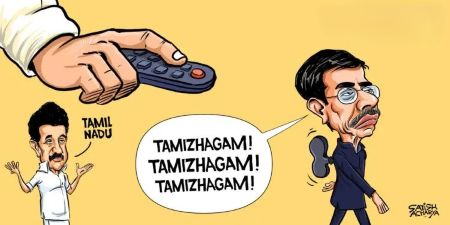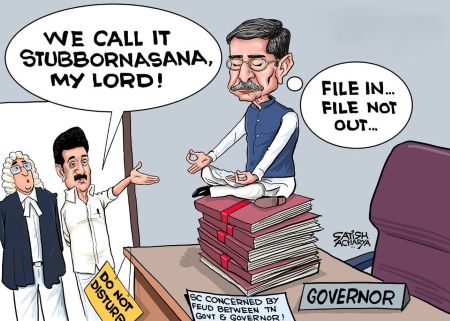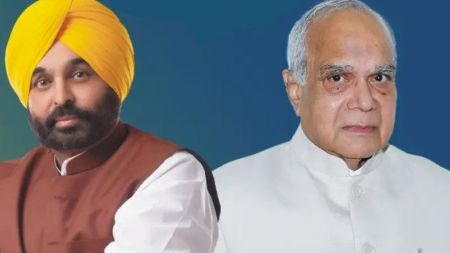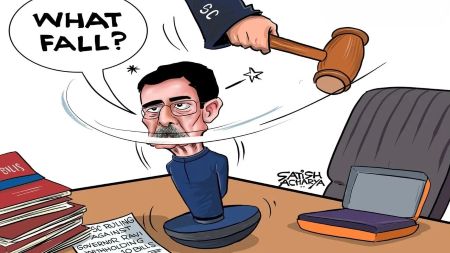Supreme Court’s landmark ruling sets limits on gubernatorial powers, reinforcing the Constitution over political gamesmanship.
THE SUPREME COURT’S ruling indicting Tamil Nadu Governor R.N. Ravi for ‘illegally’ sitting on bills passed by the state legislature has not come a moment too soon. The Governor had taken an adversarial stance against the state government and had been indulging in blatantly biased behaviour, evidently at the behest of the Centre.
He had not only been sitting on some bills passed by the legislature for over three years, but had also taken the unprecedented step of skipping portions of his speech in the Assembly—sections approved by the state cabinet and required to be read in full.

Image Courtesy: South First
In yet another unprecedented move, he walked out of the state Assembly over the playing of the state anthem. His actions were unconstitutional, and it’s no surprise that the highest court had to step in and exercise its extraordinary powers under Article 142 to deem the bills as passed, on which the Governor had been sitting for a prolonged period.
The post of Governor is a dignified one, and the incumbent is considered the first citizen of the state, with largely a ceremonial role.
While the Constitution does vest certain powers in Governors, the broad principle is that they must function according to the advice of the Council of Ministers headed by the Chief Minister.
The adversarial attitude of state Governors—often in states ruled by non-Bharatiya Janata Party (BJP)-led governments—has come under increasing scrutiny and criticism.
There is an uncanny pattern of Governors confronting non-BJP governments in states like West Bengal, Punjab, Tamil Nadu, Telangana, and Kerala, whereas such issues are conspicuously absent in BJP-ruled states or those governed by its allies.

Image Courtesy: South First
One method adopted by these adversarial Governors is to sit indefinitely on bills passed by elected state governments.
They are constitutionally required to either give assent, withhold it and return the bill for reconsideration, or refer it to the President for advice. If a bill is returned and passed again by the Assembly, the Governor is bound to grant assent.
However, these Governors have instead chosen inaction—neither approving nor returning the bills—creating a legislative deadlock.
The Supreme Court, in its judgment, stated that Ravi’s conduct “lacked bona fides and amounted to an impermissible pocket veto.”
A few months ago, the Supreme Court also took note of a similar delay by former Punjab Governor Banwarilal Purohit in granting assent to bills passed by the Assembly. During the hearing, the top court remarked that the Governor was “playing with fire.”
Also Read: Governor, CM must stop playing Tom and Jerry
Noting that India has been governed by “established traditions and conventions,” the Supreme Court bench expressed displeasure over the deadlock between the Punjab government and the Governor.

Bhagwant Mann and Banwarilal Purohit
The feud between Purohit and the Bhagwant Mann-led government concerned three money bills that were to be tabled during a special budget session. As per procedure, the Governor’s prior approval is necessary to introduce money bills in the House, which he was withholding.
In another similar case, the Supreme Court issued notice to Kerala Governor Arif Mohammad Khan in response to the Kerala government’s plea alleging delays on eight bills cleared by the Assembly and awaiting gubernatorial assent.
Khan also took the extraordinary step of asking the Chief Minister to remove the state Finance Minister from the cabinet, claiming that he had “ceased to enjoy the pleasure” of the Governor. The Chief Minister, of course, rejected this suggestion.
Earlier, former West Bengal Governor and current Vice President of India, Jagdeep Dhankhar, withheld several bills passed by the Mamata Banerjee government and frequently issued public statements critical of the state government.
🚨 SC to Governors: You’re not above the Constitution. A landmark judgment curbs political misuse of Raj Bhavan power.
Under various statutes and regulations, Governors serve as ceremonial Chancellors of publicly funded universities. Their role is largely formal—appointing Vice Chancellors, presiding over convocations, and approving notifications. However, Dhankhar interfered in the functioning of universities and questioned appointments approved by the state government, leading to a prolonged standoff with the Chief Minister until his nomination as Vice President.
Also Read: Guv vs Chief Minister confrontation may lead to constitutional showdown
Similar issues have arisen in Punjab and Karnataka, where Governors have objected to the appointments of Vice Chancellors and even sought their removal, reportedly over procedural lapses.

Image Courtesy: South First
The latest Supreme Court judgment, along with the remarks made by Justices J.B. Pardiwala and M. Mahadevan, sets a welcome precedent. The bench has clarified the ambiguity regarding the timelines within which Governors must act on bills sent by legislatures.
Governors must respect the constitutional limits of their office and allow the legislature to reflect the people’s will. The Supreme Court’s remarks serve as a firm reminder for Governors to act within their designated roles. Other Governors would do well to take note of this ruling and uphold their constitutional duties. ![]()
________
Also Read:
Judges, Cash, and Secrets: Unsolved Mysteries
Disclaimer : PunjabTodayNews.com and other platforms of the Punjab Today group strive to include views and opinions from across the entire spectrum, but by no means do we agree with everything we publish. Our efforts and editorial choices consistently underscore our authors’ right to the freedom of speech. However, it should be clear to all readers that individual authors are responsible for the information, ideas or opinions in their articles, and very often, these do not reflect the views of PunjabTodayNews.com or other platforms of the group. Punjab Today does not assume any responsibility or liability for the views of authors whose work appears here.
Punjab Today believes in serious, engaging, narrative journalism at a time when mainstream media houses seem to have given up on long-form writing and news television has blurred or altogether erased the lines between news and slapstick entertainment. We at Punjab Today believe that readers such as yourself appreciate cerebral journalism, and would like you to hold us against the best international industry standards. Brickbats are welcome even more than bouquets, though an occasional pat on the back is always encouraging. Good journalism can be a lifeline in these uncertain times worldwide. You can support us in myriad ways. To begin with, by spreading word about us and forwarding this reportage. Stay engaged.
— Team PT

